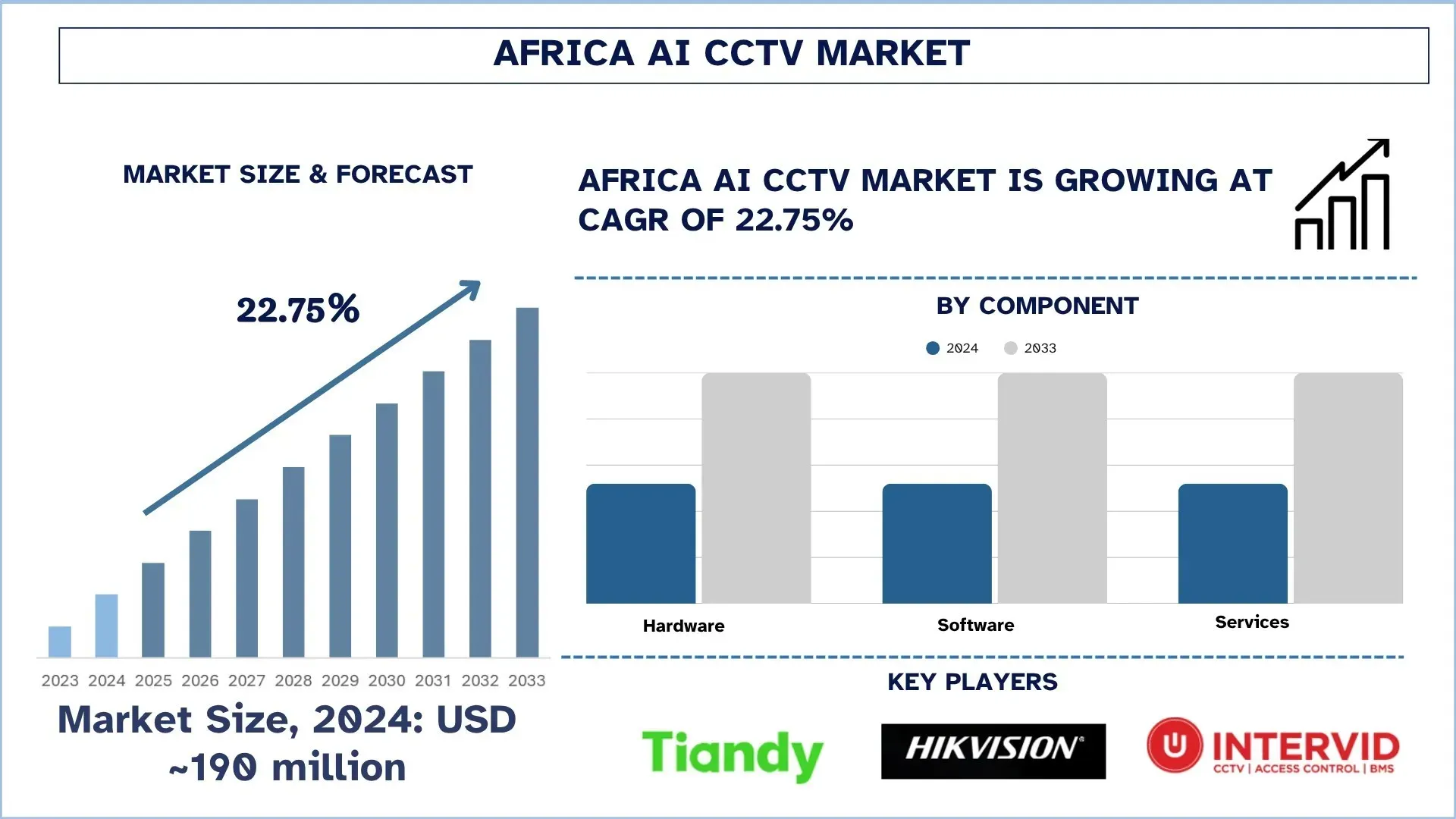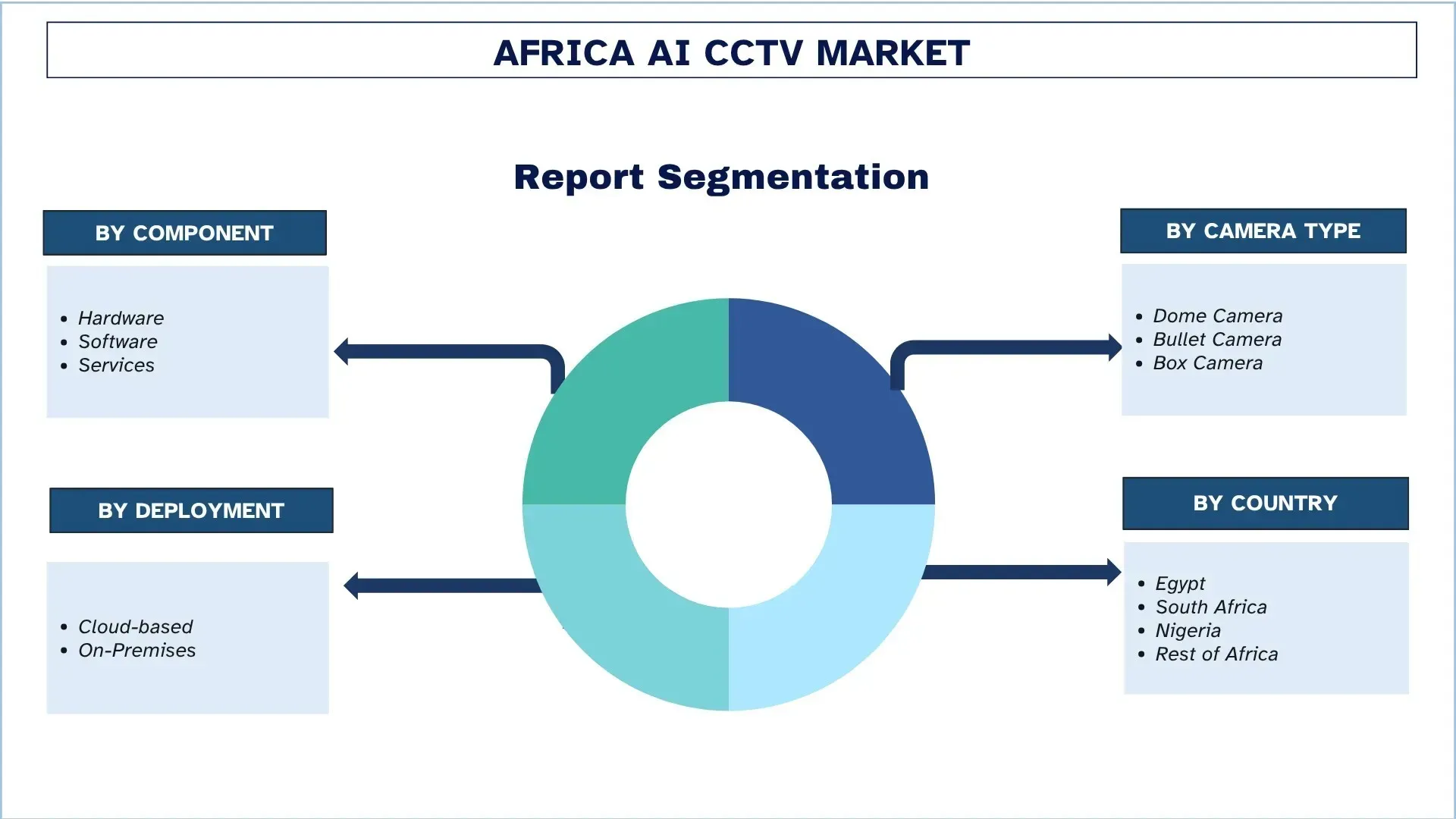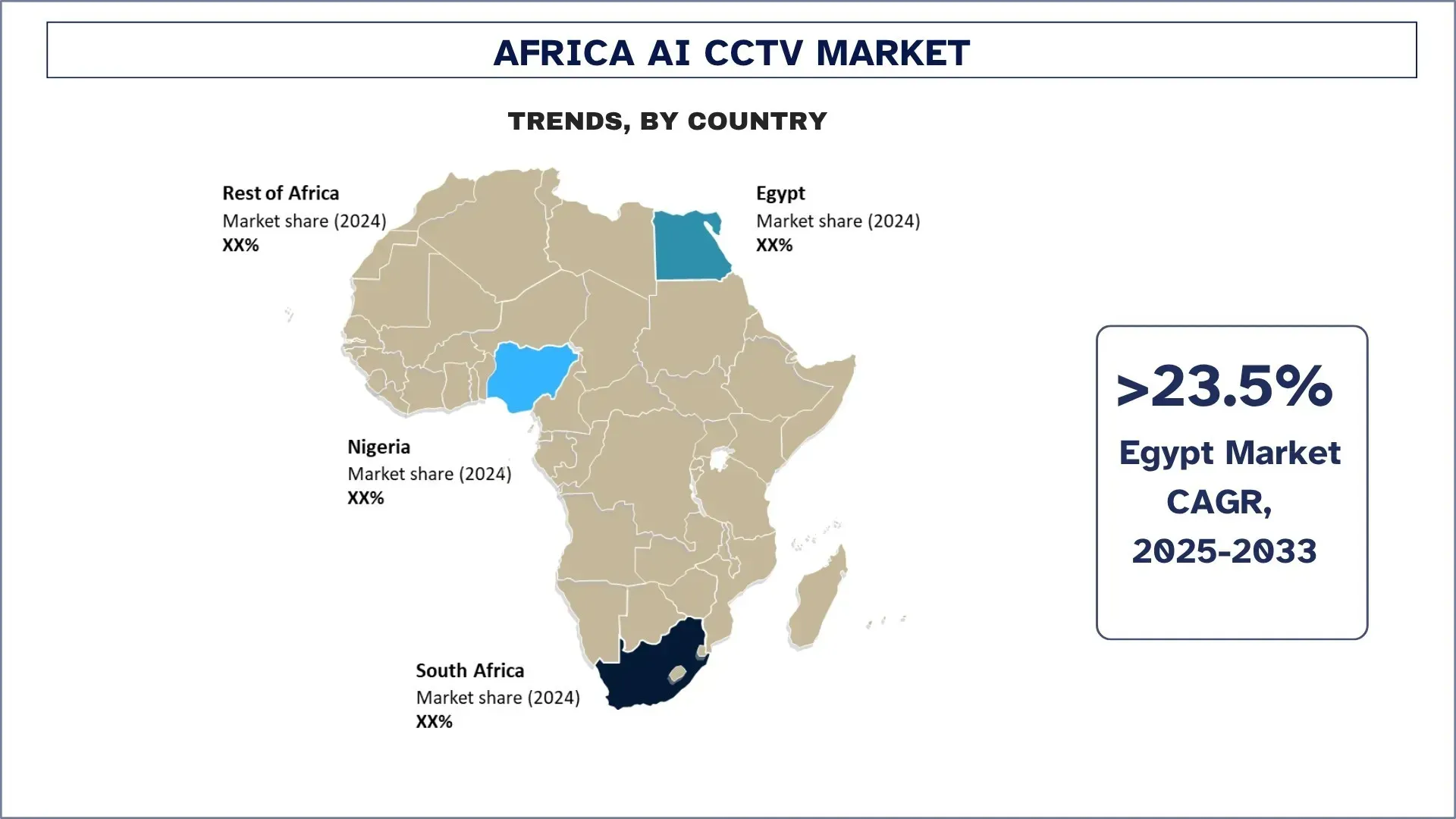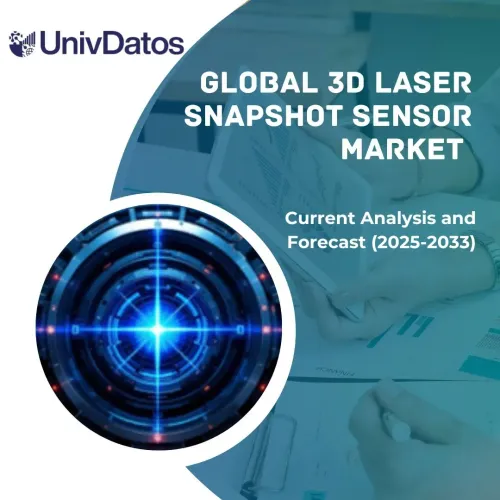- Home
- About Us
- Industry
- Services
- Reading
- Contact Us
Africa AI CCTV Market: Current Analysis and Forecast (2025-2033)
Emphasis By Component (Hardware, Software, and Services), By Camera Type (Dome Camera, Bullet Camera, and Box Camera), By Deployment (Cloud-based and On-Premises) By Country (Egypt, South Africa, Nigeria, Rest of Africa)

Africa AI CCTV Market Size & Forecast
The Africa AI CCTV Market was valued at USD 190 million in 2024 and is expected to grow at a strong CAGR of around 22.75% during the forecast period (2025- 2033F). Push from public safety & crime control imperatives, and Government & smart-city modernization initiatives are some of the factors that have supported the market rise.
Africa AI CCTV Market Analysis
The African AI CCTV market has been witnessing a rapid growth rate due to various factors such as rising smart city projects, increasing focus of the government, public, and private sectors, as well as law enforcement agencies to monitor suspicious activities. These advanced monitoring CCTV systems can not only identify objects but can also predict human behavior and provide a robust analysis of possible situations of crime. This is one of the key takeaways for law enforcement agencies, which will provide better crime prevention and timely actions. Recently, a large number ofsmart city projects have been announced in the African region, which would amplify the demand for AI CCTVs and help the respective market to flourish in the coming years.
Africa AI CCTV Market Trends
This section discusses the key market trends that are influencing the various segments of the Africa AI CCTV market, as found by our team of research experts.
Behavioral analytics & anomaly detection capabilities:
The use of AI to develop the CCTV systems in Africa is changing to be able to identify objects; however, it can now analyze behavior. Contemporary platforms have also become able to recognize human motions, the movement of crowds, and patterns of activities to detect possible threats before they develop. Rather than using human operators to keep track of hours of footage, AI models identify suspicious activities, i.e., long-term loitering, unexpected crowd rushes, or suspicious car behavior. This prediction method enables government agencies and non-governmental organizations to be on the offensive, enhancing the response time and allocation of resources. Behavioral analytics can be used in security-prone areas to conduct smarter policing and city administration, and also incur less manpower expenses. In addition, anomaly detection can be used in non-security applications like worker safety or efficiency of the traffic flow. Since such systems are still in their infancy, African cities could use real-time insights into behavior to create safer, more responsive, and data-driven spaces.
Key Market Segmentation:
This section provides an analysis of the key trends in each segment of the Africa AI CCTV market report, along with forecasts at the country and regional levels for 2025-2033.
Hardware has shown promising growth in the AI CCTV Market.
Based on component, the Africa AI CCTV market has been segmented into hardware, software, and services. The hardware sector is the largest in the AI CCTV Africa market, where there has been an increase in demand for high-quality surveillance cameras, sensors, and edge-computing units with real-time analytics capability. The constant advancement in technology in the AI chipsets, image processors, and high-resolution lenses is making systems increasingly efficient and more accurate. Also, hardware installations in the continent are being motivated by large-scale infrastructure and smart city projects.
The Dome Camera category held a significant share of the Africa AI CCTV Market.
The African AI CCTV market has been divided into dome cameras, bullet cameras, and box cameras, depending on the type of camera. Dome cameras have been found to occupy an important position in the market mainly because of the wide field of view, the aesthetic design, as well as their ability to be installed either indoors or outdoors. They are also perfect in the retail, commercial, and public areas because of their discreet look. Also, dome cameras can be equipped with infrared functions and vandal-proof casings that can provide better night-time monitoring. Their supremacy in the African market is further promoted by the increasing use of AI-driven dome cameras to monitor the population, identify faces, and run smart cities.

Egypt is expected to grow at a considerable rate during the forecast period.
The market of Egypt AI CCTV is rapidly growing due to the growing investment in the smart city programs, national security, and modernization of infrastructure. The application of AI-based surveillance systems is being implemented by the government and private sectors to detect threats in real-time, identify the faces of people, and control traffic. A combination of advanced analytics, cloud computing, and IoT is improving operational efficiency and security intelligence. Transportation, retail, and banking are some of the major industries that are using AI-powered CCTV to curb criminal activities and resource optimization. The AI CCTV market in Egypt has a high potential to grow significantly in the coming few years due to increased urbanization and the government-friendly policies of technological changes.

Africa AI CCTV Industry Competitive Landscape:
The Africa AI CCTV market is competitive, with several global and international market players. The key players are adopting different growth strategies to enhance their market presence, such as partnerships, agreements, collaborations, new product launches, geographical expansions, and mergers and acquisitions.
Top Africa AI CCTV Companies
Some of the major players in the market are Hangzhou Hikvision Digital Technology Co. Ltd., Dahua Technology Co., Ltd., Axis Communications AB, Motorola Solutions, Inc., Hanwha Vision Co. Ltd, Tiandy Technologies, Zhejiang Uniview Technologies Co., Ltd., Arlo Technologies, Inc., Intervid Africa Pty Ltd., and Broubart Security.
Africa AI CCTV Market Report Coverage
Report Attribute | Details |
Base year | 2024 |
Forecast period | 2025-2033 |
Growth momentum | Accelerate at a CAGR of 22.75% |
Market size 2024 | USD 190 Million |
Country analysis | Egypt, South Africa, Nigeria, Rest of Africa |
Major contributing Country | Egypt is expected to dominate the market during the forecast period. |
Companies profiled | Hangzhou Hikvision Digital Technology Co. Ltd., Dahua Technology Co., Ltd., Axis Communications AB, Motorola Solutions, Inc., Hanwha Vision Co. Ltd, Tiandy Technologies, Zhejiang Uniview Technologies Co., Ltd., Arlo Technologies, Inc., Intervid Africa Pty Ltd., and Broubart Security |
Report Scope | Market Trends, Drivers, and Restraints; Revenue Estimation and Forecast; Segmentation Analysis; Demand and Supply Side Analysis; Competitive Landscape; Company Profiling |
Segments Covered | by Component, by Camera Type, by Deployment, by Country |
Reasons to Buy the Africa AI CCTV Market Report:
The study includes market sizing and forecasting analysis confirmed by authenticated key industry experts.
The report briefly reviews overall industry performance at a glance.
The report covers an in-depth analysis of prominent industry peers, primarily focusing on key business financials, type portfolios, expansion strategies, and recent developments.
Detailed examination of drivers, restraints, key trends, and opportunities prevailing in the industry.
The study comprehensively covers the market across different segments.
Deep dive Country-level analysis of the industry.
Customization Options:
The Africa AI CCTV Market can further be customized as per requirements or any other market segment. Besides this, UnivDatos understands that you may have your own business needs; hence, feel free to contact us to get a report that completely suits your requirements.
Table of Content
Research Methodology for the Africa AI CCTV Market Analysis (2023-2033)
We analyzed the historical market, estimated the current market, and forecasted the future market of the Africa AI CCTV market to assess its application in major countries. We conducted exhaustive secondary research to gather historical market data and estimate the current market size. To validate these insights, we carefully reviewed numerous findings and assumptions. Additionally, we conducted in-depth primary interviews with industry experts across the AI CCTV value chain. After validating market figures through these interviews, we used both top-down and bottom-up approaches to forecast the overall market size. We then employed market breakdown and data triangulation methods to estimate and analyze the market size of industry segments and sub-segments.
Market Engineering
We employed data triangulation techniques to finalize the overall market estimation and derive precise statistical numbers for each segment and sub-segment of the Africa AI CCTV market. We split the data into several segments and sub-segments by analyzing various parameters and trends, by Component, by Camera Type, by Deployment, and by country within the Africa AI CCTV market.
The Main Objective of the Africa AI CCTV Market Study
The study identifies current and future trends in the African AI CCTV market, providing strategic insights for investors. It highlights Country-level market attractiveness, enabling industry participants to tap into untapped markets and gain a first-move advantage. Other quantitative goals of the studies include:
Market Size Analysis: Assess the current forecast and market size of the Africa AI CCTV market and its segments in terms of value (USD).
Africa AI CCTV Market Segmentation: Segments in the study include areas by Component, by Camera Type, by Deployment, and by
Regulatory Framework & Value Chain Analysis: Examine the regulatory framework, value chain, customer behavior, and competitive landscape of the Africa AI CCTV industry.
Country Analysis: Conduct a detailed Country analysis for key areas such as Egypt, South Africa, Nigeria, and the Rest of Africa.
Company Profiles & Growth Strategies: Company profiles of the Africa AI CCTV market and the growth strategies adopted by the market players to sustain the fast-growing market.
Frequently Asked Questions FAQs
Q1: What is the Africa AI CCTV market’s current market size and growth potential?
The Africa AI CCTV market was valued at 190 million in 2024 and is expected to grow at a CAGR of 22.75% during the forecast period (2025-2033).
Q2: Which segment has the largest share of the Africa AI CCTV market by Component?
The hardware sector is the largest in the AI CCTV Africa market, where there has been an increase in demand for high-quality surveillance cameras, sensors, and edge-computing units with real-time analytics capability.
Q3: What are the driving factors for the growth of the Africa AI CCTV market?
• Push from Public Safety & Crime Control Imperatives: Growing concerns over urban crime and public safety are driving governments and businesses to adopt AI-enabled surveillance systems that offer real-time monitoring and predictive threat detection.
• Government & Smart-City Modernization Initiatives: Investments in smart-city projects across major African nations are accelerating the deployment of intelligent CCTV networks to enhance infrastructure management and citizen safety.
• Declining Costs and Improved AI Hardware/Software Accessibility: The availability of affordable AI chips, cloud storage, and analytics tools is enabling broader adoption of AI-powered CCTV across public and private sectors.
Q4: What are the emerging technologies and trends in the Africa AI CCTV market?
• Edge AI / On-Device Intelligence: The integration of edge computing allows cameras to process data locally, reducing bandwidth dependence, improving responsiveness, and maintaining surveillance continuity even in low-connectivity regions.
• Behavioral Analytics & Anomaly Detection Capabilities: Advanced AI algorithms now enable CCTV systems to detect unusual behavior, crowd movements, and anomalies in real-time, enhancing proactive security and operational efficiency across African cities.
Q5: What are the key challenges in the Africa AI CCTV market?
• Scarcity of Skilled Personnel & Weak Data Ecosystems: A shortage of AI and data science professionals limits the pace of innovation, integration, and maintenance of advanced surveillance systems across the continent.
• Privacy, Regulation, and Cybersecurity Risk: Inadequate data protection laws and cybersecurity frameworks pose challenges for ethical AI use, raising concerns about misuse, data breaches, and citizens’ privacy rights.
Q6: Which country dominates the Africa AI CCTV market?
Egypt has held a sizeable market share due to factors such as a bigger population, rising urban centers, focus towards enhancing security and preventive measures for the criminal activities using the AI CCTVs.
Q7: Who are the key players in the Africa AI CCTV market?
Some of the top AI CCTV companies in Africa include:
• Hangzhou Hikvision Digital Technology Co. Ltd.
• Dahua Technology Co., Ltd.
• Axis Communications AB
• Motorola Solutions, Inc.
• Hanwha Vision Co. Ltd
• Tiandy Technologies
• Zhejiang Uniview Technologies Co., Ltd.
• Arlo Technologies, Inc.
• Intervid Africa Pty Ltd.
• Broubart Security
Q8: What are the opportunities for companies within the Africa AI CCTV market?
• Expansion into Underserved Regions & Informal Settlements: There is immense potential for AI-powered CCTV solutions in underserved urban and rural areas where traditional surveillance coverage is limited. Deploying low-cost, edge-enabled cameras can enhance safety, improve situational awareness, and support community policing in high-risk or informal zones.
• Integration with Cross-Sector Domains (Transport, Health, Infrastructure Monitoring): The integration of AI CCTV systems with other sectors, such as transportation, healthcare, and infrastructure monitoring, presents new opportunities for holistic urban management. These applications can enable traffic optimization, patient safety monitoring, and predictive maintenance of critical public assets.
Q9: How are consumer preferences shaping product development in the Africa AI CCTV market?
Consumer preferences for affordability, reliability, and data privacy are driving manufacturers to develop AI CCTV systems with edge processing, lower bandwidth needs, scalable cloud options, and enhanced cybersecurity features tailored for African environments.
Related Reports
Customers who bought this item also bought






